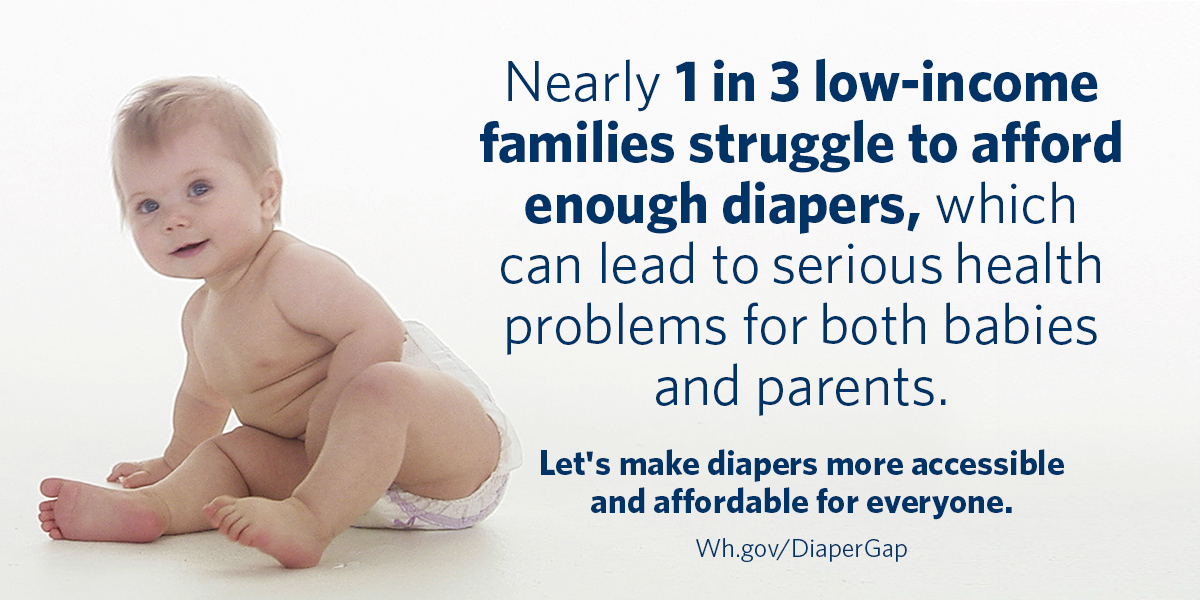
Too many parents working hard to make ends meet also pay more for their children’s basic necessities – including often paying twice as much for diapers as wealthier parents. Though some families take for granted their ability to leverage the tools of the new economy, such as online ordering and subscription services that save time and money, other families face barriers in access to broadband, access to credit and capital, and ability to receive packages at home – increasing their costs for household goods, including those critical to their children’s health and well-being.
The challenge many families face finding affordable diapers is just one example of the many ways in which families with young children face constraints in making investments in their children's development, including high-quality care and education experiences, as discussed in a new CEA issues brief released today.

From the start of their children’s lives, the high costs driven by “Surge Pricing for Diapers” strain young families’ finances and jeopardize their health. Low-income parents with infants and toddlers spend 14 percent of their income on diapers alone – leaving less room to cover rent, food, or heat. Unsurprisingly, nearly one in three low-income families report that they lack the diapers they need for their babies, causing some caregivers to stretch the time between diaper changes to make their limited resources last. This pressure can lead to serious health problems for children and unimaginable stress for parents. That public health crisis is why, earlier this year, the White House challenged the private sector to employ innovative technologies and business models to help struggling families access the basic necessities they need to care for their children.
Today, we’re excited to report that these innovative efforts are working – and expanding.
- Since its unveiling in March, the JetCares Community Diaper Program — a collaboration between Jet.com and First Quality — has shipped nearly five million diapers to non-profits in forty-eight states. Thanks to this program, some participating non-profits have doubled the number of diapers they can distribute to low-income families with the same underlying funds . Best of all, the model has proven sustainable for the participating companies, and Jet.com launched a new tool that now allows consumers to support this cause as well.
- Today, Huggies is announcing a new diaper program providing bulk shipments of diapers to National Diaper Bank Network locations at competitive prices beginning in 2017. Through “No Baby Unhugged”, Huggies and its partners have donated more than 48 million diapers and wipes in 2016 alone.
- Pampers built on its 10-year partnership with Feeding America to donate a total of nearly 19 million diapers and 19 million baby wipes to food banks across the country this year.
- LA-based Baby2Baby is on track to distribute 5 million diapers this year to over 120 non-profit partner organizations across the country - a new record for the organization.
- The Honest Company has donated 3.3 million diapers and 1 million other baby, personal care, and household products to the National Diaper Bank Network and other community partners this year.
Today the White House wants to pause to recognize the continued commitment of these organizations to closing the #DiaperGap, and their amazing progress to date.
Though the progress is encouraging, there is still more work to do to ensure that all families have access to the basics their babies need. Find out how you can get involved today.
How you can get involved:
- Join the conversation online using #DiaperGap
- Share your own story about why it’s important for all families to have access to affordable diapers.
- Host a ”Diaper Drive” in your community.
- Read the President’s take on this need for action in his Mother’s Day Medium Post on the #Diapergap.
- Learn more about barriers in accessing the tools of the new economy and innovative solutions in this “Surge Pricing for Diapers” Medium post.
- Find out what public health issues are at stake in this post by Cecilia Muñoz.
Luke Tate is the Special Assistant to the President for Economic Mobility.


